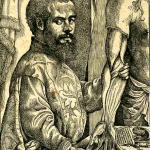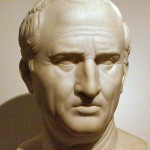This Week in Freethought History (December 29-January 4)
Here’s your week in Freethought History. This is more than just a calendar of events or mini-biographies – it’s a reminder that, no matter how isolated and alone we may feel at times, we as freethinkers are neither unique nor alone in the world.
Last Sunday, December 29, but in 1959, American stand-up comedian and writer Paula Poundstone was born. Now known for her trademark suits and ties, Poundstone started doing stand-up in Boston in 1979, then took her act to any club audience that would listen to her spontaneous, observational comedy across the country. Robin Williams liked her enough to bring her onto Saturday Night Live. By 1989 she had won the American Comedy Award for “Best Female Stand-Up Comic.” The next year, she wrote and starred in an HBO special called “Cats, Cops and Stuff,” becoming the first female to win the Cable ACE award for “Best Standup Comedy Special.” Her cable-TV specials brought her to national attention. Poundstone appeared variously on “The Tonight Show” (1992), ABC’s “Paula Poundstone Show” (1993), “The Rosie O’Donnell Show” (1996), as well as on “Hollywood Squares” and the remake of “To Tell the Truth.” Since 2003, Paula Poundstone has been a regular panelist on the NPR and Chicago Public Radio news/quiz show, “Wait Wait... Don't Tell Me!” In the May/June 1994 issue of Mother Jones, Poundstone wrote, “There is no God. At least, I’m practically certain there isn’t. I don’t believe there’s a heaven or a hell either.” Asked how long the Flood lasted in the biblical story of Noah’s Ark while appearing in a 1999 broadcast of “Hollywood Squares,” Poundstone quipped, “I don't know I am an atheist!” That same year, during an E! Entertainment special on religion in Hollywood, Poundstone stood out from most of the unconventionally “spiritual” others by saying, “I’m an atheist, so I don’t really know where spirituality fits in for me . . . a devout atheist.” And in an 11 February 2011 “Q&A with Paula Poundstone”, Paula Poundstone says,
My family, we are atheists, and many times people have had the nerve to say to us, because this is a terrible thing to say to anybody, but they say it to me: “Where will your children get their moral guidance without religion?” And I quickly assure them that we have three seasons of Lost in Space on DVD [which, she says, “we use for moral and spiritual guidance.”]. So I believe we’re covered in that area.
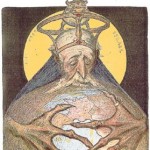 Last Monday, December 30, but in 1993, the Vatican and Israel agreed to recognize each other. This diplomatic nicety did not, of course, end anti-Semitism anymore than the establishment of the State of Israel did, but it is always gratifying to see two major superstitions agree to play nice with each other on the world stage. That one party (the Roman Church, headquartered at the Vatican) was the offender, and the other (the world’s Jews, with a homeland on appropriated real estate called Israel) was the “offendee,” did not detract from the salutary effect on the Church’s reputation. Jewish history under Christian monarchs had been one of almost unbroken persecution, savage treatment (for refusing to become Christian), the occasional blood libel, and frequent expulsions. This ill treatment was ostensibly because the Roman Church taught that the Jews were to be hated for killing their god, Christ – as if killing a god were possible. But blaming Jews for killing Christ is hypocritical: without the death of their Christ, there would be no Christianity! In fact, European Christianity used hatred of Jews as an organizing force from the earliest times. The Fundamental Agreement Between the Holy See and the State of Israel, signed on this date in 1993, came over 50 years too late for the Holocaust, and 45 years after the establishment of the State of Israel. And it also bears some theological complications. The Roman Church had been teaching for so long that God hates Jews – so… if God is right today, and Jews are not “reviled of God,” was He wrong in the Dark Age, when faith was stronger?
Last Monday, December 30, but in 1993, the Vatican and Israel agreed to recognize each other. This diplomatic nicety did not, of course, end anti-Semitism anymore than the establishment of the State of Israel did, but it is always gratifying to see two major superstitions agree to play nice with each other on the world stage. That one party (the Roman Church, headquartered at the Vatican) was the offender, and the other (the world’s Jews, with a homeland on appropriated real estate called Israel) was the “offendee,” did not detract from the salutary effect on the Church’s reputation. Jewish history under Christian monarchs had been one of almost unbroken persecution, savage treatment (for refusing to become Christian), the occasional blood libel, and frequent expulsions. This ill treatment was ostensibly because the Roman Church taught that the Jews were to be hated for killing their god, Christ – as if killing a god were possible. But blaming Jews for killing Christ is hypocritical: without the death of their Christ, there would be no Christianity! In fact, European Christianity used hatred of Jews as an organizing force from the earliest times. The Fundamental Agreement Between the Holy See and the State of Israel, signed on this date in 1993, came over 50 years too late for the Holocaust, and 45 years after the establishment of the State of Israel. And it also bears some theological complications. The Roman Church had been teaching for so long that God hates Jews – so… if God is right today, and Jews are not “reviled of God,” was He wrong in the Dark Age, when faith was stronger?
Last Tuesday, December 31, but in 1514, Flemish anatomist Andreas Vesalius was born. Vesalius was the son of the court-apothecary to the Emperor Charles V and studied medicine in the tradition of the ancient Roman anatomist Galen (129-211), but in acquiring great skill in dissection, he discovered many errors in Galen’s work. When Vesalius was only 28, he published the greatest work on human anatomy yet seen De Humani Corporis Fabrica, which influenced the understanding of human anatomy up to the 19th century. It is with some irony that Vesalius is claimed by the Catholic Encyclopedia and is considered one of the great Catholic scientists. Even that reference admits, “Personally he avoided expressing his opinion, in order not to fall under suspicion of heresy,” which is as if to say that Vesalius might have been a freethinker if the price of professing it were not his life! In fact, Vesalius was harassed by the Church all his life, and only as physician to Emperor Charles V was he protected from the Inquisition. The cause of this clerical hostility is a further irony: the famous anatomist was hounded for his practice of human dissection! Human dissection was considered forbidden by the Roman Church since Tertullian and Augustine. What irked the Church was perhaps not so much that Vesalius dissected human bodies, but that when he did so he did not find this highly venerated if highly speculative “resurrection bone.” Furthermore, as the legend of Adam and Eve demonstrates, there must be one less rib in male humans than in females. This, too, Vesalius found erroneous. Finally, the charge of dissecting a living man was trumped up – the man’s family also charged Vesalius with Atheism – and the Inquisition moved against the greatest surgeon in Europe. The price of protecting Vesalius from the pope’s ecclesiastical enforcers was a pilgrimage to Jerusalem. He reached Jerusalem, but never made it back home, dying at age 49 in Zakinthos, Greece, on 15 October 1564. You could say Andreas Vesalius died for the church that persecuted him.
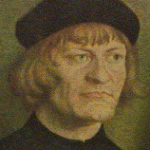 Last Wednesday, January 1, but in 1484, Swiss Protestant reformer Huldrych Zwingli was born. Zwingli was the only major Protestant reformer of the 16th century whose movement did not become a church. Similar to but apart from Martin Luther’s reforms, his were yet another attempt to return to scripture and to escape the corrupting effect of priesthood on church doctrine which so disturbed ex-Catholics about their former church. While a disputant of Luther’s, Zwingli managed to find more accommodation for science within scripture than his more famous Reformation contemporary. He enjoyed his correspondence with Dutch humanist and theologian Desiderius Erasmus. To the modern age, one of Zwingli’s more interesting breaks with the Roman Church was on the doctrine of celibacy and chastity. The chief objection to his taking the office of leut-priest in Zürich was that he had seduced a girl of good family. He denied the charge, but admitted to following what amounts to a 16th century version of “free love.” From 1522, Zwingli cohabited with a Zurich innkeeper’s daughter, Anna Reinhard, only marrying her in 1524 when social pressure demanded it. They produced four children with no discernable diminution of Zwingli’s ecclesiastical effectiveness. Huldrych Zwingli died in battle, serving as a field chaplain, when Swiss Catholics overwhelmed his heretical enclave in Zürich, in 1531. His body was quartered, hanged and burned, as befits those who disagree with the priests of the gentle Galilean.
Last Wednesday, January 1, but in 1484, Swiss Protestant reformer Huldrych Zwingli was born. Zwingli was the only major Protestant reformer of the 16th century whose movement did not become a church. Similar to but apart from Martin Luther’s reforms, his were yet another attempt to return to scripture and to escape the corrupting effect of priesthood on church doctrine which so disturbed ex-Catholics about their former church. While a disputant of Luther’s, Zwingli managed to find more accommodation for science within scripture than his more famous Reformation contemporary. He enjoyed his correspondence with Dutch humanist and theologian Desiderius Erasmus. To the modern age, one of Zwingli’s more interesting breaks with the Roman Church was on the doctrine of celibacy and chastity. The chief objection to his taking the office of leut-priest in Zürich was that he had seduced a girl of good family. He denied the charge, but admitted to following what amounts to a 16th century version of “free love.” From 1522, Zwingli cohabited with a Zurich innkeeper’s daughter, Anna Reinhard, only marrying her in 1524 when social pressure demanded it. They produced four children with no discernable diminution of Zwingli’s ecclesiastical effectiveness. Huldrych Zwingli died in battle, serving as a field chaplain, when Swiss Catholics overwhelmed his heretical enclave in Zürich, in 1531. His body was quartered, hanged and burned, as befits those who disagree with the priests of the gentle Galilean.
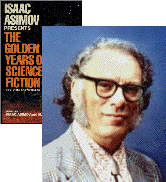 Last Thursday, January 2, but in 1920, prolific American science and science fiction writer Isaac Asimov was born. He was educated in Orthodox Judaism, but religion had little influence throughout Asimov’s childhood. Asimov studied chemistry at Columbia University, New York, where he graduated in 1939, received his M.A. in 1941, and in 1948, earned a Ph.D. in biochemistry. He lectured from 1955 to 1958 at Boston University School of Medicine, but his first love was writing. It was as a science writer, but most famously as a science-fiction writer, that Asimov, for works such as the Foundation Trilogy and I, Robot, became one of a triumvirate of S‑F immortals that included Arthur C. Clarke (1917-2008) and Robert A. Heinlein (1907-1988). Asimov turned out 470 books in four decades of writing, and on a dizzying array of topics, including Shakespeare, Gilbert and Sullivan, literature, technology, world history, mythology – and four memoirs. In one of these he noted, “I have never, in all my life, not for one moment, been tempted toward religion of any kind. The fact is that I feel no spiritual void. I have my philosophy of life, which does not include any aspect of the supernatural.” The American Humanist Association named Asimov Humanist of the Year in 1984 and later voted him its president. In The Roving Mind, Asimov wrote, “Don’t you believe in flying saucers? they ask me. Don’t you believe in telepathy? – in ancient astronauts? – in the Bermuda Triangle? – in life after death? No, I reply. No, no, no, no, and again no.” Only toward the end of his life was Asimov comfortable in admitting his atheism. “Since I am an atheist,” he said in his final memoir, “and do not believe that either God or Satan, Heaven or Hell, exists, I can only suppose that when I die, there will only be an eternity of nothingness to follow.” “Life is pleasant” wrote Asimov, “Death is peaceful. It’s the transition that’s troublesome.”
Last Thursday, January 2, but in 1920, prolific American science and science fiction writer Isaac Asimov was born. He was educated in Orthodox Judaism, but religion had little influence throughout Asimov’s childhood. Asimov studied chemistry at Columbia University, New York, where he graduated in 1939, received his M.A. in 1941, and in 1948, earned a Ph.D. in biochemistry. He lectured from 1955 to 1958 at Boston University School of Medicine, but his first love was writing. It was as a science writer, but most famously as a science-fiction writer, that Asimov, for works such as the Foundation Trilogy and I, Robot, became one of a triumvirate of S‑F immortals that included Arthur C. Clarke (1917-2008) and Robert A. Heinlein (1907-1988). Asimov turned out 470 books in four decades of writing, and on a dizzying array of topics, including Shakespeare, Gilbert and Sullivan, literature, technology, world history, mythology – and four memoirs. In one of these he noted, “I have never, in all my life, not for one moment, been tempted toward religion of any kind. The fact is that I feel no spiritual void. I have my philosophy of life, which does not include any aspect of the supernatural.” The American Humanist Association named Asimov Humanist of the Year in 1984 and later voted him its president. In The Roving Mind, Asimov wrote, “Don’t you believe in flying saucers? they ask me. Don’t you believe in telepathy? – in ancient astronauts? – in the Bermuda Triangle? – in life after death? No, I reply. No, no, no, no, and again no.” Only toward the end of his life was Asimov comfortable in admitting his atheism. “Since I am an atheist,” he said in his final memoir, “and do not believe that either God or Satan, Heaven or Hell, exists, I can only suppose that when I die, there will only be an eternity of nothingness to follow.” “Life is pleasant” wrote Asimov, “Death is peaceful. It’s the transition that’s troublesome.”
Yesterday, January 3, but in 106 BCE, Roman statesman and orator Marcus Tullius Cicero was born. Having chosen parents not among the ruling class in oligarchic Rome, Cicero rose through the political ranks – quaestor, aedile, praetor, and consul – much as one would today: after distinguishing himself as a lawyer. At the peak of his political career, as Consul, in 63 BCE, Cicero exposed the Catiline conspiracy to overthrow Rome. Cicero was not only an idealist in morals but an advanced skeptic toward religion. In his rejection of the Roman (pagan) religion, he was followed by many of the educated in Roman society. He declined to join in the First Triumvirate, which gave Cicero’s enemies an opening to apply an ex post facto law to get him exiled. Banned from politics even after his return from exile in 47 BCE, Cicero had much time to reflect on philosophy. His treatise On the Nature of the Gods gives the arguments for and against the existence of God, but he takes neither side. After the collapse of the First Triumvirate, the crossing of the Rubicon, the civil war, and the murder of Julius Caesar (44 BCE), Cicero made the wrong enemies by bitterly attacking Marc Antony in speeches he called Philippics. The Second Triumvirate agreed on a power-sharing plan and Marc Antony took revenge by ordering the orator’s assassination. Belatedly attempting to flee Rome, Cicero was murdered on 7 December 43 BCE. By Antony’s order, Cicero’s head and his hands were cut off and nailed to the speaker’s podium in the Senate as a warning to others.
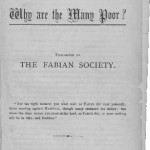 Today, January 4, but in 1884, the longest-lived, continuously operating Socialist organization, the Fabian Society, was founded in London. Founders Frank Podmore and Edward Pease envisioned a society opposed to the revolutionary theory of Marxism, holding instead that social reforms and Socialistic public policy can be instituted through “permeation”: that is, through Socialist public policy writing and election of Fabian-supported Members of Parliament – in effect, using the system to change the system. The Fabians were appropriately named for the Roman general Quintus Fabius (ca. 280-203 BCE), known as Cunctator from his strategy of delaying battle until the right moment, thereby weakening the opposition without resorting to pitched battle. The Fabians achieved recognition with the publication of Fabian Essays, beginning in 1889 with a tract on poverty – Why Are the Many Poor?, which came out in the wake of the 1888 Match Girls’ Strike – and by employing some rather talented writers. Some of the better-known Fabians include atheist-turned Theosophist Annie Besant, the virulently anti-Christian dramatist George Bernard Shaw, the Atheist and novelist H. G. Wells, the Rationalist and statesman Harry Snell, and the Agnostic poet who died before his time, Rupert Brooke – which, you can see from the links in this blog, were Freethinkers.
Today, January 4, but in 1884, the longest-lived, continuously operating Socialist organization, the Fabian Society, was founded in London. Founders Frank Podmore and Edward Pease envisioned a society opposed to the revolutionary theory of Marxism, holding instead that social reforms and Socialistic public policy can be instituted through “permeation”: that is, through Socialist public policy writing and election of Fabian-supported Members of Parliament – in effect, using the system to change the system. The Fabians were appropriately named for the Roman general Quintus Fabius (ca. 280-203 BCE), known as Cunctator from his strategy of delaying battle until the right moment, thereby weakening the opposition without resorting to pitched battle. The Fabians achieved recognition with the publication of Fabian Essays, beginning in 1889 with a tract on poverty – Why Are the Many Poor?, which came out in the wake of the 1888 Match Girls’ Strike – and by employing some rather talented writers. Some of the better-known Fabians include atheist-turned Theosophist Annie Besant, the virulently anti-Christian dramatist George Bernard Shaw, the Atheist and novelist H. G. Wells, the Rationalist and statesman Harry Snell, and the Agnostic poet who died before his time, Rupert Brooke – which, you can see from the links in this blog, were Freethinkers.
Other birthdays and events this week—
January 1: British anthropologist, folklorist and author of The Golden Bough, Sir James George Frazer was born (1854).
January 3: Belgian archaeologist and philologist Franz Valery-Marie Cumont was born (1868).
We can look back, but the Golden Age of Freethought is now. You can find full versions of these pages in Freethought history at the links in my blog, FreethoughtAlmanac.com.
NB: With this blog posting, I conclude the series. Happy New Year! ~Ronald

